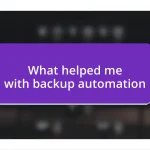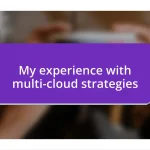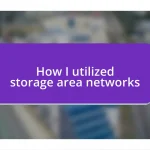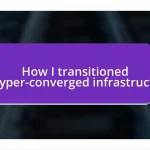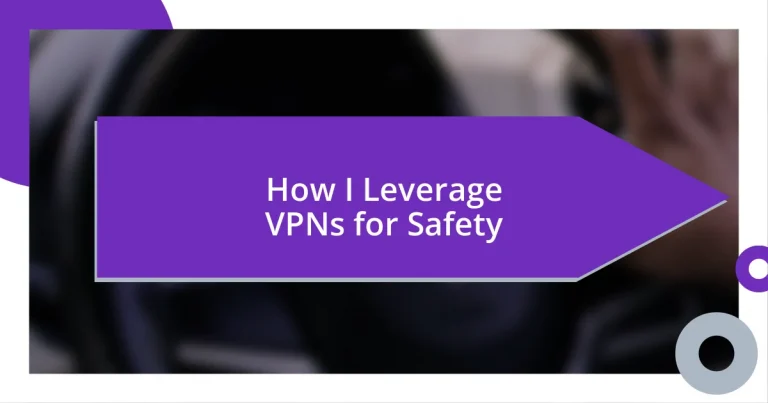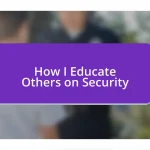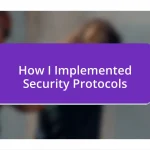Key takeaways:
- A VPN enhances online security by encrypting data, providing privacy protection, and allowing access to geo-restricted content.
- Choosing a reputable VPN service involves considering factors like a no-logs policy, security features, server locations, speed, and user-friendliness.
- Best practices for VPN usage include ensuring the VPN is active before accessing sensitive information, regularly updating the software, and being cautious with public Wi-Fi networks.
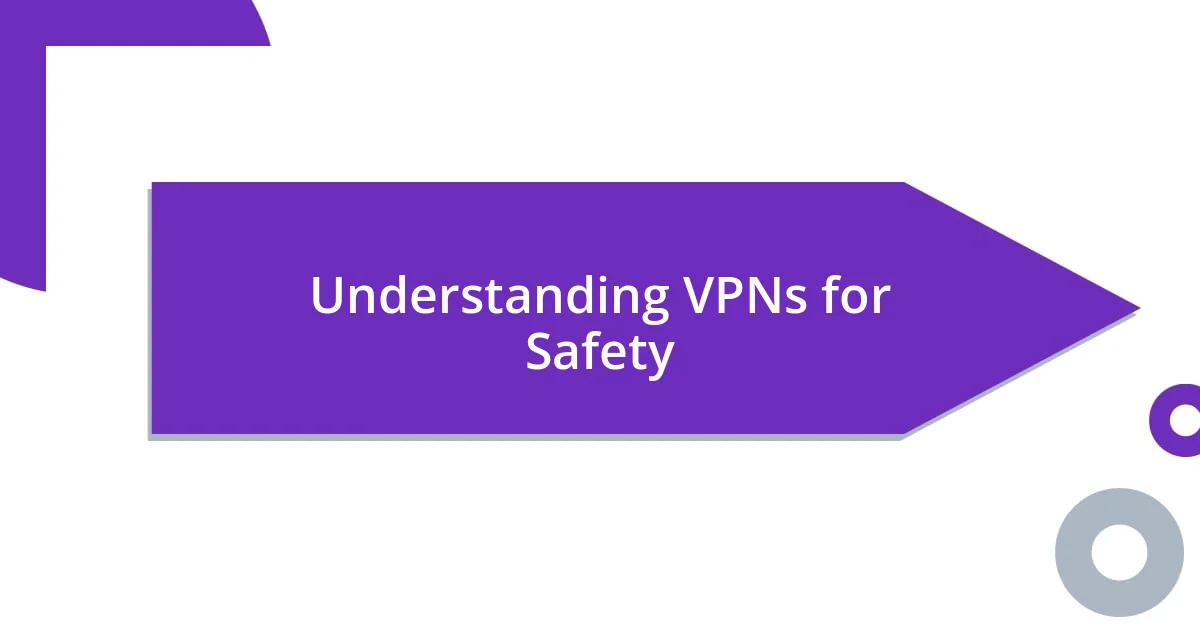
Understanding VPNs for Safety
When I first started using a VPN, I was amazed at how easily it made my online presence more secure. A VPN, or Virtual Private Network, encrypts your internet connection, shielding your data from prying eyes. It’s like having a private tunnel that keeps your information safe while you surf the web, which is incredibly reassuring, especially in this age of frequent data breaches.
Have you ever felt that little twinge of anxiety when connecting to public Wi-Fi? I certainly have! With a VPN, that worry fades away. Knowing that your personal details—like passwords and credit card numbers—are encrypted gives you a sense of control over your online safety. This protection extends not just to me, but to anyone using the network, making it a must-have tool for anyone concerned about their digital footprint.
Understanding this technology is essential; it allows us to browse freely and securely. When I travel, for instance, I often rely on a VPN to access my favorite streaming services. It’s not just about privacy; it’s about reclaiming my access to my digital life wherever I go, transforming my online experience into something that feels safe and familiar, even in unfamiliar places.
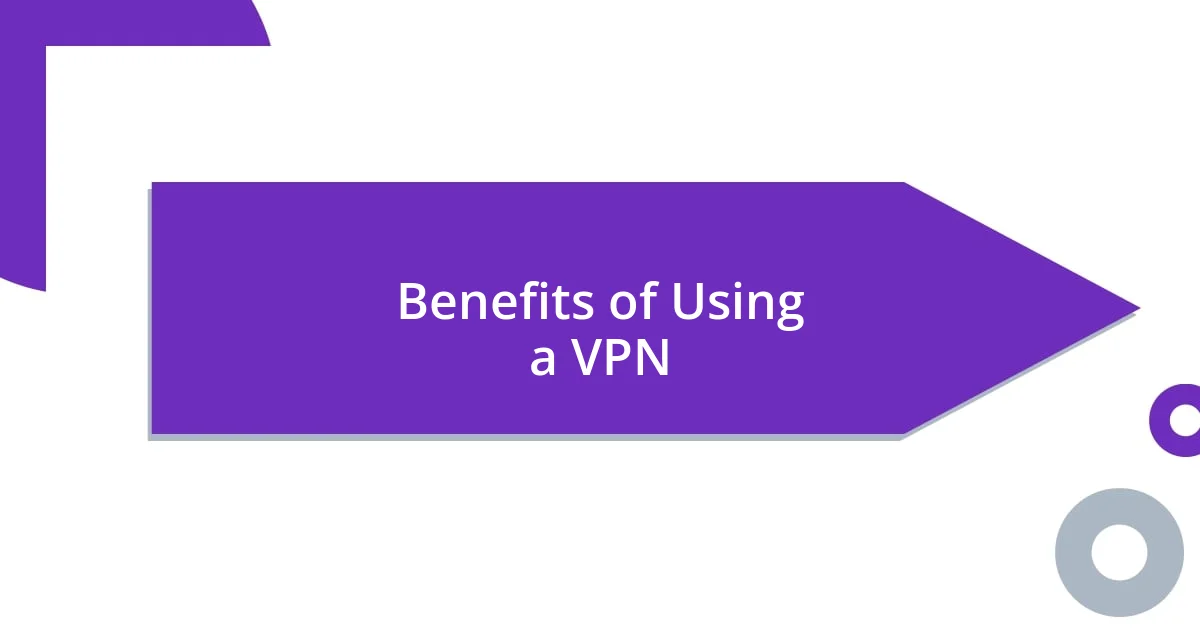
Benefits of Using a VPN
Using a VPN brings a multitude of benefits that enhance my online experience. One of the standout advantages is the heightened level of privacy it provides. I vividly recall a time when I used a public café’s Wi-Fi to catch up on some work. It hit me that anyone nearby could potentially intercept my data. With a VPN, I can confidently engage in online activities, knowing my information is encrypted and secured against potential threats.
Another significant benefit I appreciate is the ability to bypass geographical restrictions. For example, during my last trip abroad, I wanted to watch my favorite show that was blocked in the region I was visiting. By connecting to my home country’s server through the VPN, I was able to access content just like I would at home. This flexibility makes traveling much more enjoyable, as it allows me to engage with my usual digital services seamlessly.
Lastly, I find that using a VPN enhances my overall online security. Given the rise of cyber threats, I feel a heightened sense of protection knowing that unencrypted connections are a thing of the past for me. It’s comforting to know that when I share sensitive information, like when I make online purchases, my data is shielded from malicious actors. In a world where data breaches are common, having this layer of security empowers me to surf the internet without constant worry.
| Benefit | Description |
|---|---|
| Privacy Protection | Encrypts data, preventing unauthorized access. |
| Access to Geo-Restricted Content | Bypasses location restrictions for seamless streaming. |
| Enhanced Security | Secures sensitive information against cyber threats. |
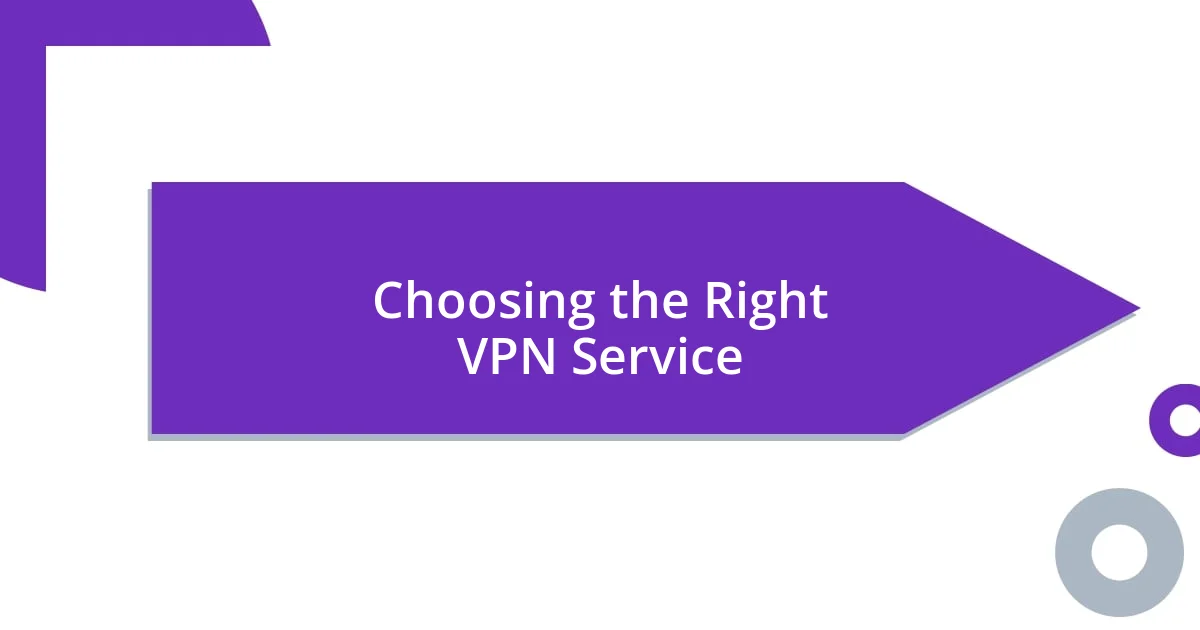
Choosing the Right VPN Service
Choosing the right VPN service can feel overwhelming, but I’ve learned a few key aspects that make the decision clearer. For me, the first thing to consider is the privacy policy of the provider. I remember the time I was comparing several options, and discovering that one service kept logs of user activity made me feel uneasy. I want a service that prioritizes my privacy, free from the fear of my data being potentially exposed.
Here are some essential factors I look for when choosing a VPN service:
- Privacy Policy: Ensure the provider has a strict no-logs policy.
- Security Features: Look for robust encryption methods and additional features like a kill switch.
- Server Locations: A diverse range of servers means more options for bypassing geo-restrictions.
- Speed and Performance: Test speed through reviews; a slower connection can dampen the streaming experience.
- Customer Support: Responsive support is vital for troubleshooting any issues that may arise.
Another aspect I focus on is user-friendliness. The last thing I want is the frustration of a complicated interface that takes ages to navigate. I recall a night when I was trying to set up a VPN for the first time; finding a user-friendly service made all the difference. It felt empowering to connect quickly and begin enjoying the online benefits without constant headaches. A friendly interface can turn what could be a daunting experience into something simple and even enjoyable.
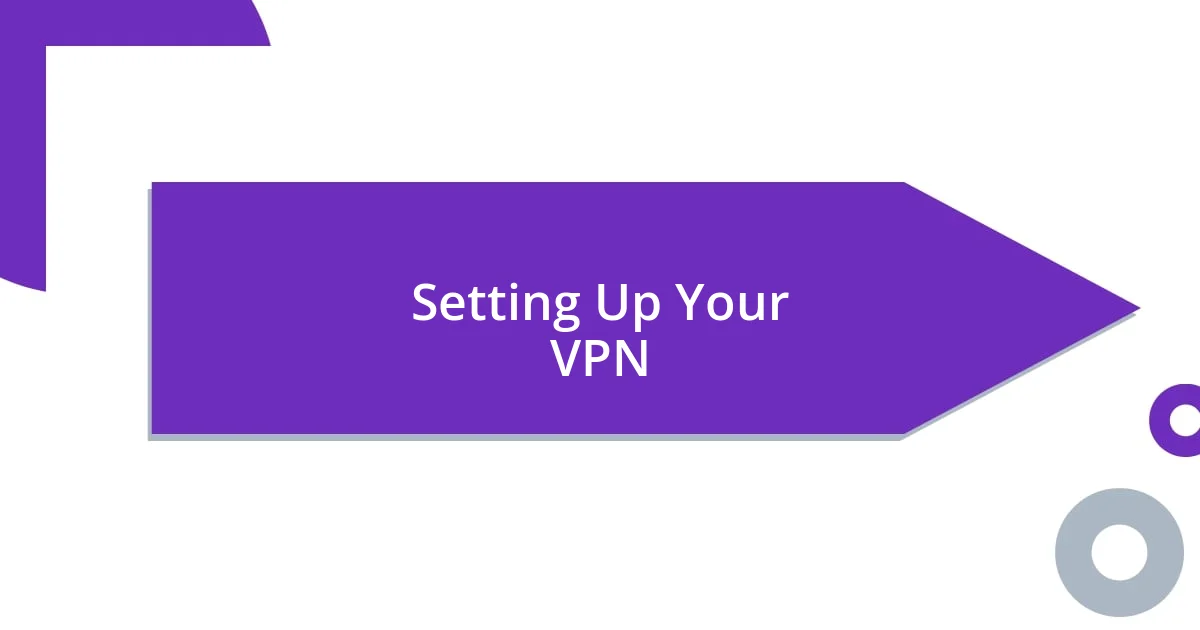
Setting Up Your VPN
Setting up your VPN can feel daunting, but I’ve learned that taking it step by step makes the process much smoother. When I first downloaded my VPN, I vividly remember staring at the installation screen, wondering if I’d accidentally make a mistake. Fortunately, most reputable VPN services offer clear instructions, which helped me get everything running in no time. Trust me, once you get through that setup, the peace of mind it brings is worth every second.
One tip that really helped me was choosing the right protocol during installation. For instance, I usually opt for OpenVPN because of its strong security features. I recall a friend of mine just going with the default settings and later finding out they missed out on certain security enhancements. If you’re unsure, take a moment to research the best protocol choices—it really boosts your safety!
Once installed, I recommend testing your VPN connection to ensure it’s working properly. The first time I connected, I did a quick check on my IP address to see if it changed. It was exhilarating to discover I was virtually in a different location! This simple action really confirmed to me that my online activities were now shielded from prying eyes. Have you thought about what it would feel like to browse the internet without fear? Setting up your VPN is the first step in achieving that sense of freedom.
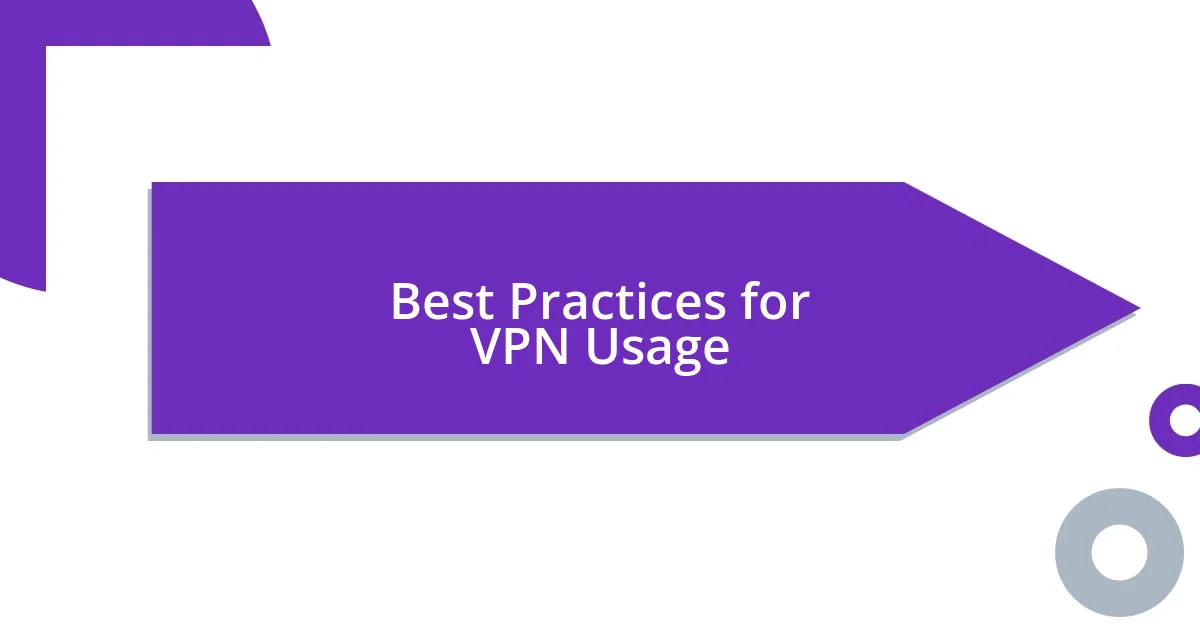
Best Practices for VPN Usage
When using a VPN, I always ensure my connection is active before accessing sensitive information, like banking details. There’s something unsettling about online transactions without the added layer of security, like walking alone at night in an unfamiliar area. I remember one evening attempting to pay a bill while traveling; the second I realized my VPN wasn’t on, I felt an immediate wave of anxiety. Properly connecting my VPN before any online activity has since become a non-negotiable routine for me.
Another practice I swear by is regularly updating my VPN software. These updates often come with security improvements that help protect against emerging threats. I recall a time when I neglected an update, only to realize later that it could have closed a critical vulnerability. It’s a simple task, but staying current ensures I maintain the best level of protection and keeps my browsing experience smooth.
Lastly, I recommend being cautious with public Wi-Fi networks. While they offer convenience, I’ve learned the hard way that they can be major hotspots for hackers. I remember sitting in a coffee shop, feeling pretty confident as I connected to their public network. Little did I know, some sneaky individuals were scanning for unprotected connections. From that day on, I never log into sensitive accounts without my VPN—even the convenience of that latte isn’t worth the risk!
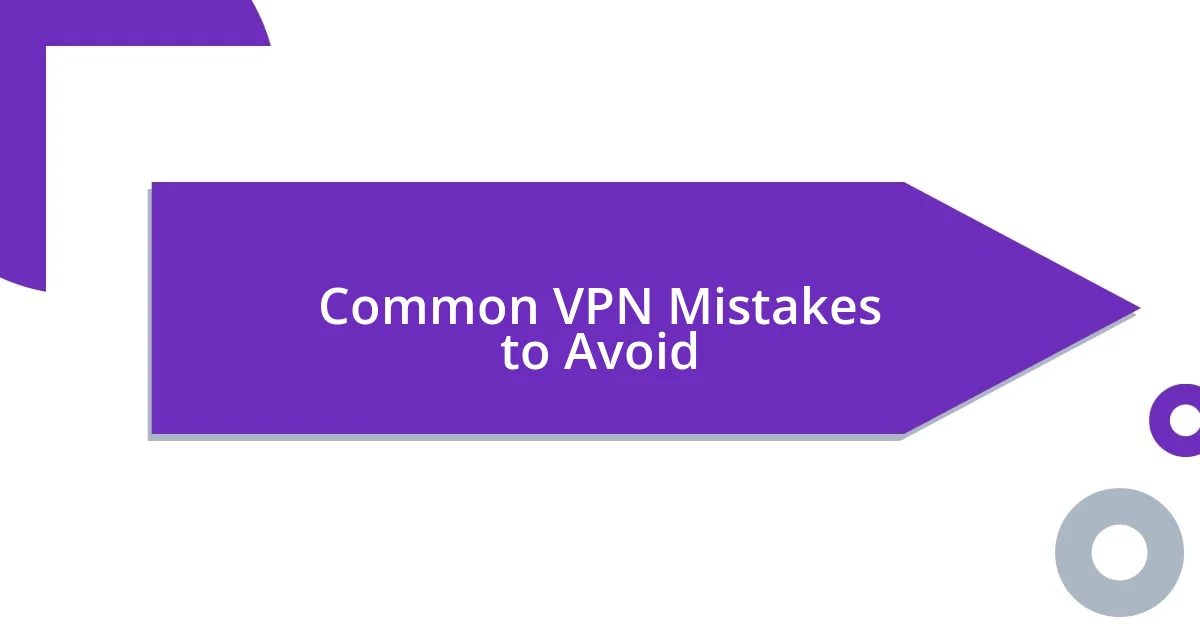
Common VPN Mistakes to Avoid
When I think about the common mistakes people make with VPNs, one that stands out is neglecting to double-check your settings. It’s easy to get caught up in the excitement of using a VPN, but I learned the hard way that a little oversight can expose you to risks. I once set mine up but didn’t realize the kill switch feature wasn’t activated, and that left me vulnerable during one of my browsing sessions. Have you ever thought about how these small, overlooked details can lead to significant consequences?
Another common blunder is choosing a free VPN service. I remember when I first ventured into the world of VPNs, and the allure of a free option was hard to resist. However, after doing my homework, I discovered that many of these free services often come with hidden costs, like logging data or limited security. Spending a few dollars on a reputable provider has made all the difference in my online safety and peace of mind. Wouldn’t it feel better to invest in your security than to risk your privacy for the sake of saving money?
Lastly, I often see users forgetting to log out of their VPN if they switch networks or log in on a different device. I’ve experienced this myself—connecting to my home network after using a public one and realizing I’d left my VPN disabled. It felt like leaving the door open when I stepped out! Making it a habit to check your VPN status every time you switch environments can prevent unnecessary dangers. It’s a small step, but it makes a world of difference in staying protected.
